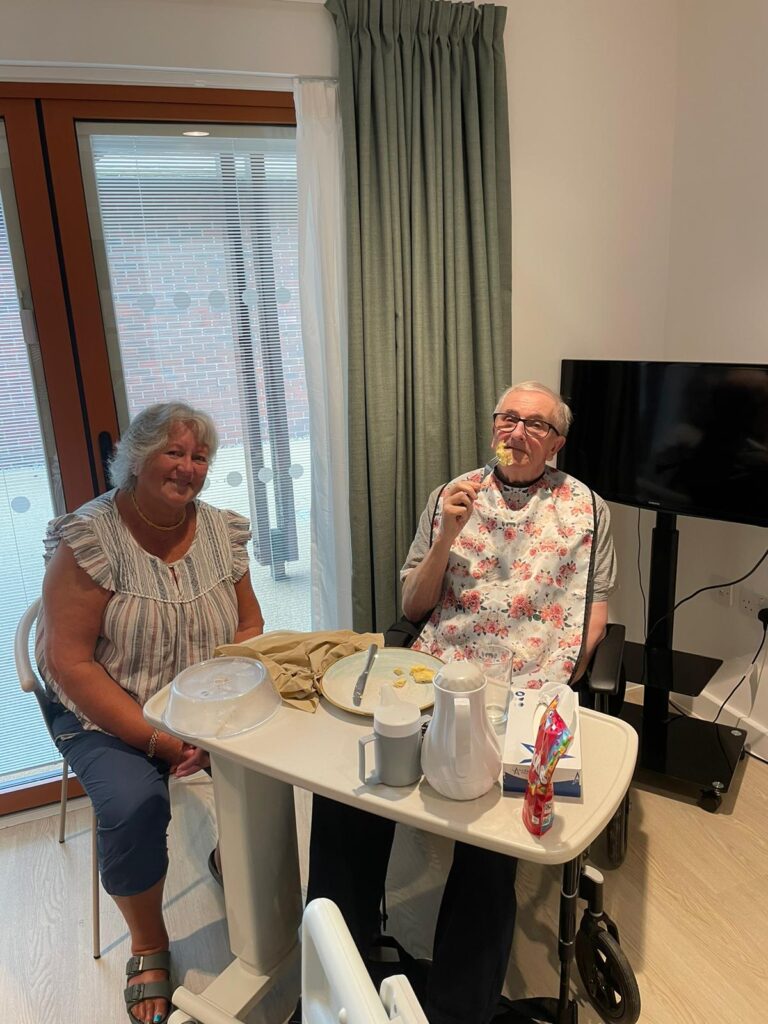Nightingale House Hospice provides support for family facing rare PSP diagnosis
When Peter Taylor was diagnosed with the rare neurological condition Progressive Supranuclear Palsy (PSP) four years ago, his family faced an overwhelming journey filled with uncertainty.
Peter’s daughter, Katie Taylor, a nurse, knew that her father’s care needs would become increasingly complex, but she wasn’t sure if there were any services in the area that could specifically help with PSP.
While many associate hospice care with cancer, Nightingale House also offers vital support for patients with neurological conditions such as Progressive Supranuclear Palsy (PSP), Motor Neurone Disease (MND), and Parkinson’s disease.
Katie was familiar with some of the services offered at Nightingale House due to her nursing background but wasn’t sure if the charity could support with a PSP diagnosis.
After making a self-referral on her father’s behalf, Peter began accessing a range of services, including rehabilitation, complementary therapy, the Wellbeing Programme, and respite care. These services provided crucial relief for both Peter and his family during his illness.
Katie shared her heartfelt appreciation for the hospice’s care and said: “Nightingale House was the one place my family felt happy and safe leaving my dad, Peter, knowing he would be looked after.
“When he was staying for respite, my family and I often visited, and we could push him out into the garden so he could enjoy the fresh air – a luxury you don’t realise you have until it’s taken away.
“One day, while my dad was in for respite, he spoke to a doctor about watching a football match on TV, and she came and watched it with him so that he wasn’t on his own. That level of kindness and attention meant so much to us.”
Progressive Supranuclear Palsy is a rare and often misdiagnosed condition, frequently mistaken for Parkinson’s disease. Through Peter’s experience, Nightingale House Hospice hopes to raise awareness about PSP and highlight the broad range of conditions they care for.
Dr Mellissa Everett at Nightingale House Hospice said: “Hospices are often associated with caring for patients with cancer, but we support many more conditions, including heart failure, liver and kidney failure, respiratory conditions like COPD, and neurological conditions such as PSP, MND, MS, and Parkinson’s disease.
“Our involvement can be beneficial much earlier in the disease’s progression, helping patients maintain strength and function while offering a variety of services such as physiotherapy, hydrotherapy, and complementary therapies.”
Nightingale House Hospice offers respite admissions to provide patients and their families with a break, along with emotional support throughout their journey. Families like the Taylors have found immense comfort knowing that their loved one was cared for with compassion and kindness, by a dedicated team committed to the patient’s wellbeing.
Peter Taylor passed away in August, but his family remains thankful for the care he received at Nightingale House. “Knowing that Dad was treated with dignity and respect until the very end has given us peace during this difficult time,” Katie added.
For more information on Nightingale House Hospice’s services and how they can support patients with neurological conditions, please contact 01978 316800 or visit: nightingalehouse.co.uk






